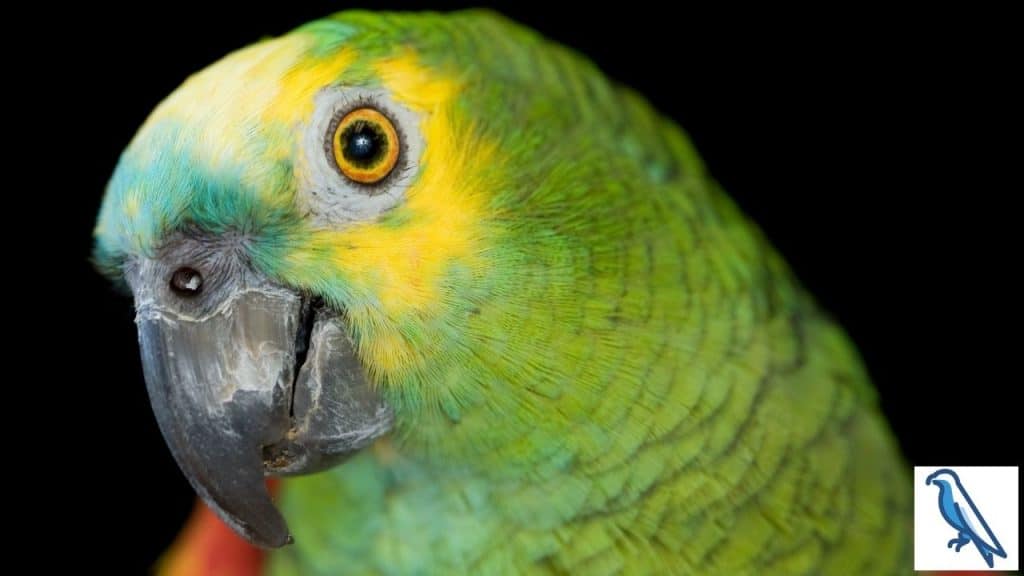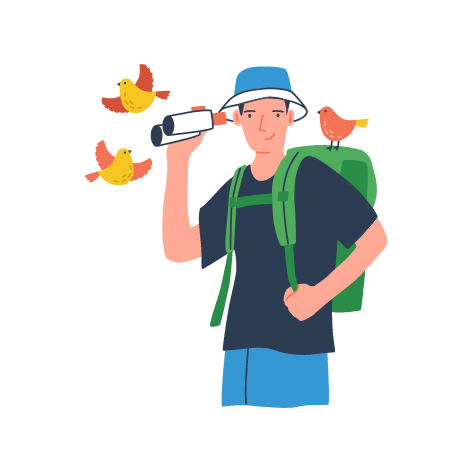
Parrots are intelligent social birds and, at the same time, can be hilarious too. They can communicate with their owners vocally or via body language.
Head bobbing is one such behavior used by parrots for communication. So, why do parrots bob their heads?
Parrots bob their head for many reasons. Pet parrots may bob head in anger, excitement, out of hunger, boredom, to seek the owner’s attention or for bonding.
While in the wild, male parrots bob their head for mating dance or display territorial aggression when other birds intrude in their territory.
Head bobbing is one form of communication between parrots. Parrots may bob heads for exercise.
However, this may not be the only reason for your parrot’s head bobbing. So, let’s delve deeper to understand whether head bobbing is normal and the various reasons behind it.

Is It Normal If Your Parrots Bob Their Heads?
Parrots bobbing their head is entirely normal, and nothing is alarming. The majority of the time, the reason behind head bobbing is to seek the owner’s attention. Also, you may find your parrot bobbing its head if it is feeling bored, hungry, or is excited.
Although head bobbing is expected most of the time, you should not take it lightly if your parrot is bobbing its head frequently. At times, it can be due to illness.
Hence, it would help if you closely watch the behavior of your parrot. If you find anything abnormal, do not hesitate to visit a veterinarian for an appropriate check-up and treatment.
Interesting Further Reading:
Reasons Parrots Bob Their Heads
Parrots are fascinating and intelligent creatures. Their body language can at times be entertaining to watch. Nevertheless, they always seem to communicate with us. Be it by ruffling their feathers, flapping their wings, hanging upside down, or bobbing their head.
Domesticated parrots communicate with their owners either through speaking or head bobbing. If you can correctly guess your parrot’s body language, you can quickly determine whether they are sad, happy, anxious, or angry over something.
There are various reasons for which your parrot may be bobbing its head. Some of the common reasons are listed below.
To Seek Attention
Parrots bob their heads to seek attention. If you do not interact with your parrot and are busy doing some other chores, it will bob its head to seek your attention.
Pet parrots crave for owner’s attention. Just like toddlers, parrots also need social interaction to stay healthy. Hence, when you notice your parrot bobbing its head, perhaps it is time to socialize or play with your parrot.
Parrots Are Hungry
Another common reason for your parrot’s head bobbing is hunger. As babies, parrots entirely depend upon their parents or owners for feeding. If you own an un-weaned baby parrot, it will bob its head, begging for food when hungry. Head bobbing is a signal to you that your baby parrot needs some food to eat.
Some parrots carry this behavior later on in their life. They tend to bob their head when they are low on food supply and need a refill.
Parrots Are Excited Or Angry
Parrots can display a range of emotions through their body language. They often express their anger or excitement by head bobbing. You can notice your parrot doing head bobbing when it is feeling excited. Many parrots get excited when they hear their favorite music. Also, your parrot may bob its head out of excitement when you are feeding it or playing with him. You can find your parrot happy and enthusiastic when it is bobbing its head out of pleasure.
On the contrary, parrots even bob their head in anger. It is mainly when something around is upsetting your parrot. Even if you ignore your parrot, it will bob its head in anger.
Out Of Boredom
Parrots are social birds. They need interaction to keep themselves occupied. In captivity, if your parrots are cooped inside the cage for a longer duration without any interaction with you or other parrots, they will get bored.
Your parrots will then bob or bounce their head up and down to indicate that they are bored and need some entertainment.
To Create Bond With The Owner
Parrots bob their head to bond with their owner. It is their way of showing affection towards the owners. This bonding, at times, can take the form of regurgitating their food.
Parrots often regurgitate the food in their mate’s or chicks’ mouths to feed them. This behavior of parrots looks entertaining with its mate or chicks.
However, if your parrot is trying to bond with you by regurgitating the food, it should be discouraged. As then, your parrot may start looking upon you as its mate and may further complicate things.
Other Reasons To Consider
Parrots are unique personalities having a whole myriad of communicative behaviors. They may do head bobbing for various reasons, and it may be challenging to understand the specific reason.
The best way to understand the reason for your parrot’s head bobbing is to spend enough time with your feathered bird. It will help you to acquaint yourself with your parrot’s moods and personality.
Recommended Further Reading:
- Do Parrots Have Tongue? + Use Of Parrot’s Tongue
- Do Parrots Lay Eggs? (When, How Do Parrots Lay Eggs)
- Why Do Parrots Live So Long? + How To Make A Parrot Live Longer In Captivity?
Why Do Parrots Bob Their Heads In The Wild?
Head bobbing is a natural behavior among many species of parrots in the wild.
Young parrots bob their head in front of their mother to indicate they are hungry.
Mother parrot then feeds their young ones and reward their behavior.
Another reason for head bobbing among parrots is to attract mates.
A male parrot may bob its head when a female parrot is around to grab her attention. It can be a mating dance.
Besides, wild parrots also bob their head to display territorial aggression.
If some other bird enters their territory, the strong parrot will bob its head up and down, indicating that the surrounding area is its territory.
The other bird may back off to avoid any confrontation with the aggressive parrot.
Related Questions

Hi, There and Welcome to BirdsNews.com, is here to help you learn and care about pet birds. and this blog is a journal of everything I’ve learned.
